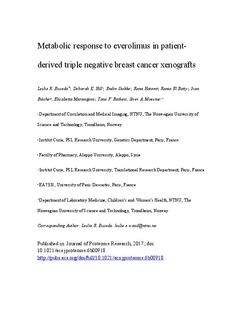| dc.contributor.author | Euceda, Leslie R. | |
| dc.contributor.author | Hill, Deborah Katherine | |
| dc.contributor.author | Stokke, Endre | |
| dc.contributor.author | Hatem, Rana | |
| dc.contributor.author | Botty, Rania | |
| dc.contributor.author | Bieche, Ivan | |
| dc.contributor.author | Marangoni, Elisabetta | |
| dc.contributor.author | Bathen, Tone Frost | |
| dc.contributor.author | Moestue, Siver Andreas | |
| dc.date.accessioned | 2017-05-31T08:16:29Z | |
| dc.date.available | 2017-05-31T08:16:29Z | |
| dc.date.created | 2017-03-15T11:39:38Z | |
| dc.date.issued | 2017 | |
| dc.identifier.issn | 1535-3893 | |
| dc.identifier.uri | http://hdl.handle.net/11250/2443942 | |
| dc.description.abstract | Patients with triple-negative breast cancer (TNBC) are unresponsive to endocrine and anti-HER2 pharmacotherapy, limiting their therapeutic options to chemotherapy. TNBC is frequently associated with abnormalities in the PI3K/AKT/mTOR signaling pathway; drugs targeting this pathway are currently being evaluated in these patients. However, the response is variable, partly due to heterogeneity within TNBC, conferring a need to identify biomarkers predicting response and resistance to targeted therapy. In this study, we used a metabolomics approach to assess response to the mTOR inhibitor everolimus in a panel of TNBC patient-derived xenografts (PDX) (n = 103 animals). Tumor metabolic profiles were acquired using high-resolution magic angle spinning magnetic resonance spectroscopy. Partial least-squares-discriminant analysis on relative metabolite concentrations discriminated treated xenografts from untreated controls with an accuracy of 67% (p = 0.003). Multilevel linear mixed-effects models (LMM) indicated reduced glycolytic lactate production and glutaminolysis after treatment, consistent with PI3K/AKT/mTOR pathway inhibition. Although inherent metabolic heterogeneity between different PDX models seemed to hinder prediction of treatment response, the metabolic effects following treatment were more pronounced in responding xenografts compared to nonresponders. Additionally, the metabolic information predicted p53 mutation status, which may provide complementary insight into the interplay between PI3K signaling and other drivers of disease progression. | nb_NO |
| dc.language.iso | eng | nb_NO |
| dc.publisher | American Chemical Society | nb_NO |
| dc.title | Metabolic response to everolimus in patient-derived triple negative breast cancer xenografts | nb_NO |
| dc.type | Journal article | nb_NO |
| dc.type | Peer reviewed | nb_NO |
| dc.source.journal | Journal of Proteome Research | nb_NO |
| dc.identifier.doi | 10.1021/acs.jproteome.6b00918 | |
| dc.identifier.cristin | 1458492 | |
| dc.relation.project | Kreftforeningen: 2209215 | nb_NO |
| dc.relation.project | Norges forskningsråd: 239940 | nb_NO |
| dc.description.localcode | Copyright © 2017 American Chemical Society. This is the authors' accepted and refereed manuscript to the article. Locked until 14 March 2018 due to copyright restrictions | nb_NO |
| cristin.unitcode | 194,65,25,0 | |
| cristin.unitcode | 194,65,10,0 | |
| cristin.unitname | Institutt for sirkulasjon og bildediagnostikk | |
| cristin.unitname | Institutt for laboratoriemedisin, barne- og kvinnesykdommer | |
| cristin.ispublished | false | |
| cristin.fulltext | postprint | |
| cristin.qualitycode | 2 | |
